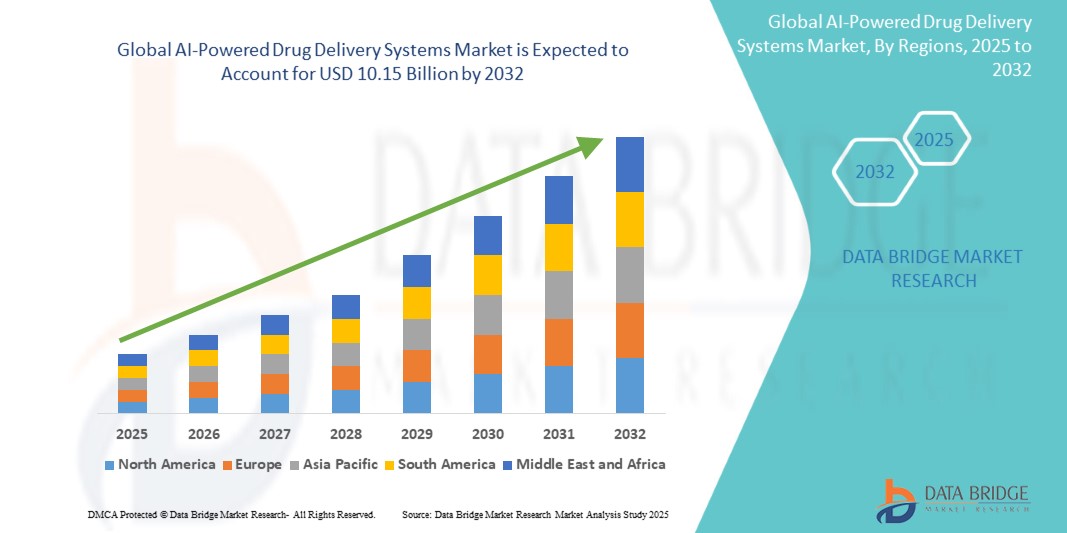Introduction
AI-Powered Drug Delivery Systems are emerging as a groundbreaking innovation. These systems leverage machine learning algorithms, big data analytics, and robotics to optimize the delivery of therapeutics with unprecedented precision and efficiency. The AI-powered drug delivery systems market is gaining significant traction as pharmaceutical companies, biotech firms, and healthcare providers seek to improve drug efficacy, minimize side effects, and personalize treatment regimens.
This article delves into the key drivers, challenges, technological developments, and growth prospects of the AI-powered drug delivery systems market.
Understanding AI-Powered Drug Delivery Systems
AI-powered drug delivery systems refer to technological solutions that use artificial intelligence to design, control, and monitor how medications are administered to patients. These systems aim to ensure targeted delivery, optimal dosage, and real-time monitoring, enhancing therapeutic outcomes and patient safety.
AI can process massive datasets, including patient history, genomics, disease progression, and pharmacokinetics, to predict the best course of drug administration. From nanocarriers and smart pills to implantable devices, AI plays a vital role in optimizing these delivery platforms.
Market Dynamics
Market Drivers
-
Personalized Medicine Growth
With a shift toward precision medicine, there is a rising need for drug delivery systems that cater to individual patient profiles. AI enables the analysis of genomic and health data to tailor drug administration, boosting patient-specific outcomes. -
Technological Advancements in AI and IoT
Integration of AI with Internet of Things (IoT) devices facilitates real-time drug monitoring and smart delivery. For instance, ingestible sensors can transmit drug adherence data to physicians, improving disease management. -
Rising Chronic Diseases
The growing prevalence of chronic diseases such as cancer, diabetes, and cardiovascular disorders necessitates continuous and controlled drug delivery. AI aids in designing systems that release drugs at the right time and dosage. -
Pharmaceutical R&D Innovations
Pharma companies are increasingly investing in AI-driven platforms for drug formulation and delivery system development. AI shortens drug development cycles and enhances the efficiency of clinical trials.
Key Technologies in AI-Driven Drug Delivery
-
Machine Learning (ML)
ML algorithms analyze vast biomedical datasets to predict drug responses, optimize formulations, and recommend appropriate delivery methods. -
Natural Language Processing (NLP)
NLP helps extract insights from unstructured medical records, research papers, and clinical data to support decisions on drug delivery mechanisms. -
Robotics and Automation
AI-powered robotic systems are used in micro-implantation procedures and nanotechnology-based delivery, offering ultra-precise therapeutic interventions. -
Digital Twin Technology
This emerging technology allows virtual modeling of the human body to simulate drug interactions and delivery outcomes before actual treatment.
Market Segmentation
By Drug Delivery Type:
-
Smart Pills
-
Inhalers
-
Wearable Injectors
-
Implantable Devices
-
Nanoparticle-based Delivery Systems
By Therapeutic Application:
-
Oncology
-
Neurology
-
Cardiovascular
-
Infectious Diseases
-
Endocrinology (Diabetes, Thyroid)
By End-User:
-
Hospitals & Clinics
-
Research Institutes
-
Pharmaceutical & Biotech Companies
-
Home Healthcare
Regional Insights
-
North America
North America dominates the AI-powered drug delivery systems market, owing to advanced healthcare infrastructure, heavy investments in AI startups, and favorable government support. The U.S. FDA has shown openness to AI-based solutions, fueling rapid innovation. -
Europe
Europe is investing heavily in digital health and AI through initiatives such as Horizon Europe. Countries like Germany and the UK are leading in the deployment of AI in personalized drug delivery research. -
Asia-Pacific
With a rapidly expanding healthcare sector and growing R&D in countries like China, Japan, and India, the Asia-Pacific region is poised for the fastest growth in this market. -
Middle East & Africa / Latin America
Although currently at a nascent stage, these regions are gradually adopting digital health technologies and are expected to witness moderate growth over the forecast period.
Competitive Landscape
The market is highly competitive, with several key players developing AI-integrated drug delivery solutions. Some of the notable companies include:
-
Becton, Dickinson and Company (BD)
-
Medtronic
-
Johnson & Johnson
-
Proteus Digital Health
-
Insulet Corporation
-
3M
-
Eli Lilly
-
Novartis
-
IBM Watson Health
-
Google Health (Verily Life Sciences)
Startups and tech giants are also entering the space, with collaborations between pharmaceutical and AI firms becoming increasingly common. These partnerships accelerate the commercialization of smart delivery systems.
Challenges and Limitations
-
Regulatory Hurdles
Gaining approval for AI-driven medical devices and drug delivery systems is a complex, time-consuming process that demands stringent compliance with data and device regulations. -
Data Privacy and Security
Since AI relies heavily on personal health data, ensuring data privacy and cybersecurity is critical to building trust and compliance with laws like HIPAA and GDPR. -
High Development Costs
Developing AI-powered drug delivery systems involves significant investment in R&D, clinical trials, and technology infrastructure, posing barriers for small and mid-sized firms. -
Integration with Existing Healthcare Systems
Implementing AI solutions into legacy healthcare systems can be technically challenging and requires significant training for healthcare professionals.
Future Outlook
The future of the AI-powered drug delivery systems market looks extremely promising. As AI algorithms become more sophisticated and regulatory bodies become more accommodating, we can expect:
-
Wider adoption of personalized dosing solutions
-
Integration with wearable biosensors for real-time feedback
-
Development of AI-powered nanobots for targeted delivery
-
Expansion into underdeveloped markets via mobile health (mHealth) platforms
Market analysts project a double-digit CAGR for the AI-powered drug delivery systems market over the next decade, driven by continuous innovation and increasing demand for precision therapy.
Get More Details:
https://www.databridgemarketresearch.com/reports/global-ai-powered-drug-delivery-systems-market
Conclusion
AI-powered drug delivery systems mark a pivotal evolution in the healthcare and pharmaceutical industries. By merging computational intelligence with biomedical engineering, these systems offer precise, safe, and effective drug delivery tailored to individual needs. While challenges remain, ongoing research, technological progress, and collaborative ecosystems are paving the way for widespread adoption. As the industry matures, AI-driven drug delivery is set to become a cornerstone of modern medicine—unlocking the full potential of personalized healthcare.
